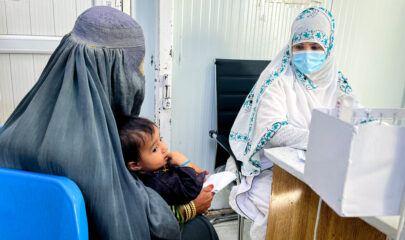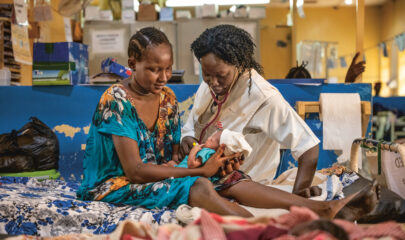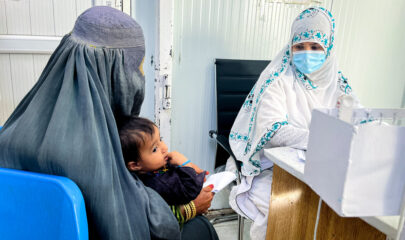INVESTMENT IN NEW IDEAS DRIVES CHANGE, HELPS SAVE LIVES
Over the last decade, we have witnessed an increasing complexity and scale of medical and humanitarian challenges around the world. In 2016, Doctors Without Borders/ Médecins Sans Frontières (MSF) launched the Transformational Investment Capacity (TIC), designed to transform MSF’s ability to respond to these challenges.
The COVID-19 pandemic brings unprecedented challenges and is accelerating MSF’s efforts to harness innovation and adopt new ways of working. This can take on many forms – from developing new medical technologies to designing innovative training for MSF front-line staff.

One such example is the TIC-supported MSF Field Simulation for Operations project. This project is delivering practical simulation learning solutions at the field level and improving the quality of urgent lifesaving medical care for our patients. Simulations emulate on-the-job realities and offer a safe training environment – especially for staff facing new challenges such as COVID-19.
“By bringing simulation-based learning into MSF operations, our front-line staff gain access to practical onsite learning experiences and the opportunity to strengthen their competencies and confidence in their roles as healthcare providers,” says Marta Iscla, MSF project manager.
In April, the project team successfully completed an 18-month TIC project piloting simulation in Gowza, Nigeria; Batangafo, Central African Republic; and Kumba, Cameroon. The pilots strengthened staff skills on priority themes, including pediatrics, trauma, mass casualties, cholera, diphtheria and more.

More recently, the project team produced a series of videos to support front-line staff preparing for COVID-19, including one on personal protective equipment (PPE) for suspected/confirmed cases. The video package, which is available in English, French, Spanish, Portuguese and Arabic, helps teams organize simulation-based learning on infection prevention and control measures.
The team has received positive feedback that the videos are helping front-line staff apply vital procedures and protocols in their COVID-19 response and they are developing additional solutions based on field demand.

To date, TIC has invested in 60 transformation projects and is providing project teams with funding, human resources and intellectual capital to help drive change. Through the TIC initiative, any MSF staff from anywhere in the world, including past field workers, can propose an idea or solution to dramatically strengthen MSF’s ability to deliver medical assistance to people affected by epidemics, conflict, disasters or exclusion from healthcare. All proposals are evaluated and, if successful, are supported by the TIC selection committee. The committee includes international experts in technology, medicine, finance, entrepreneurship, humanitarian operations and human capital.
“MSF recognizes the urgent need to invest in transformation and to take advantage of recent medical and technological advances – such as artificial intelligence, data analytics and hybrid energy. These advances represent unique opportunities to better serve the needs of our patients today and prepare us for the challenges of tomorrow,” says Emmanuel Guillaud, TIC lead.
“With support from our donors, this critical investment is made possible.”
To watch TIC’s training video on using PPE for confirmed or suspected cases of COVID-19, go to www. doctorswithoutborders.ca/ppe.
To learn more about MSF’s Transformational Investment Capacity (TIC), please visit msf-transformation.org.


